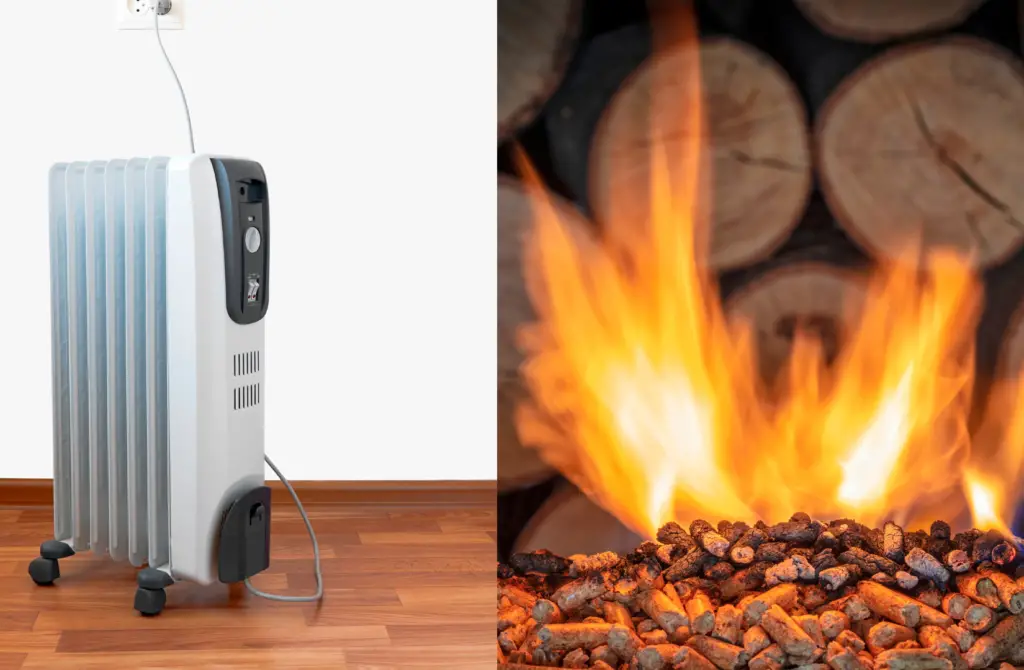Biomass boilers have gained popularity as a renewable energy source, with many homeowners and businesses exploring their potential for reducing carbon emissions and energy costs. However, whether biomass boilers are genuinely energy efficient is a topic of debate in the industry.
Biomass boilers can be energy efficient when used correctly and with proper maintenance. They have an efficiency rating of between 80-90% while in operation, though adequate insulation and appropriate sizing is essential. They are more efficient when compared to fossil fuel heaters.
When operated correctly, they can achieve high energy efficiency levels, reducing fuel costs and carbon emissions. This article will help you know more about the energy efficiency of biomass boilers.

How do Biomass Boilers Work?
Biomass boilers burn organic materials, such as wood chips or pellets, to generate heat and hot water. The system feeds the fuel stored in the hopper into the combustion chamber as needed.
In the chamber, the fuel burns in the presence of oxygen, which transfers heat to a heat exchanger. The heat exchanger warms the water, which then circulates to radiators, underfloor heating systems, or other heating systems as required. The system also transfers the heat generated to a buffer tank to boil water for the house’s hot water needs.
The biomass used here is usually in the form of wood logs, wood pellets, or wood chips. As a result of this, they are usually very large. Conventional biomass that makes use of fuels or gas has a smaller volume compared to biomass.

Also, the homeowner would need to have storage space for the biomass, to aid easy access and proper safekeeping. The biomass is fed into the boiler either manually or automatically.
The biomass boiler operators periodically remove and dispose of the ash produced by the combustion process.
Burning biomass fuel in a boiler is similar to burning fossil fuels such as oil or gas, but with the added advantage that biomass is a renewable resource and considered carbon neutral.
This makes biomass boilers more environmentally friendly than traditional fossil fuel boilers.
It’s important to note that not all biomass boilers are created equal, and the system’s efficiency will depend on various factors. These include the quality of the fuel, the design of the boiler, and the maintenance and operating practices of the user.
It is recommended that you choose a high quality boiler for maximum efficiency from your Biomass boiler. Also, follow recommended procedures and ensure regular maintenance is done on the system.
Electricity Output vs. Electricity Input
The electricity output from a biomass boiler is determined by the heat generated by burning the biomass fuel and the efficiency of the heat transfer system.
The electricity input refers to the energy required to operate the boiler and associated systems, such as fans or pumps.
The ratio of electricity output to input is called the “electrical efficiency” of the system. The electrical efficiency of a biomass boiler will depend on various factors. Some of these factors are the quality of the fuel, the design of the boiler, and the maintenance and operating practices of the user.
Choosing a high-quality biomass boiler, following recommended operating procedures, and performing regular maintenance are vital to maximizing the electrical efficiency of the system.
Do Biomass Boilers Use a lot of Electricity?
Biomass boilers do not use a lot of electricity, but they require some energy input to operate. This energy input is used to power the system that feeds the fuel into the combustion chamber. Also, it removes the ash produced by the combustion process.
Some biomass boilers sometimes require electricity to operate fans, pumps, and other associated systems.
The amount of electricity required by a biomass boiler will depend on various factors, such as the size of the system, the type of fuel being used, and the operating conditions.
However, compared to other heating systems, such as oil or gas boilers, the electricity requirements of biomass boilers are relatively low.
Additionally, because renewable and carbon-neutral materials fuel biomass boilers, they offer a more environmentally friendly option than traditional fossil fuel boilers.

Can a Biomass Boiler Heat the Whole House?
Biomass boilers can heat the entire house if properly sized and installed. They can produce a large amount of heat, making them suitable for residential and commercial heating systems.
However, the actual size and capacity of the boiler required to heat an entire house will depend on various factors. Some of which include the insulation and energy efficiency of the building, the local climate, and the heating needs of the occupants.
It’s essential to work with a professional to determine the appropriate capacity of the biomass boiler required for your home.
This will help ensure that the system is efficient, cost-effective, and capable of meeting the heating needs of the occupants. Proper installation, maintenance, and system operation are also important factors in maximizing performance and efficiency.
Compare Energy Efficiency with Other Common Types of Heating System
Biomass boilers are energy efficient compared to other common types of heating systems, such as oil or gas boilers, radiant floor heating systems, heat pumps, and furnaces.
Oil or Gas Boilers
Compared to oil or gas boilers, biomass has a higher thermal efficiency. This is because biomass fuel is burned in the presence of oxygen, which allows for the complete combustion of the fuel and the generation of maximum heat.

Biomass boilers often feature a larger heat exchanger, enabling greater heat transfer from the combustion process to the water utilized for heating.
Radiant Floor Heating Systems
Biomass boilers are typically considered more energy-efficient than radiant floor heating in terms of overall system efficiency. This is because biomass boilers generate heat through combustion. It can reach high temperatures and provide a large amount of heat for the building.
While radiant floor heating can provide consistent and even heat, it can also be less efficient than biomass boilers. This is due to the need for large amounts of energy to generate the heat.
Heat Pumps
Biomass boilers are typically considered more energy-efficient than heat pumps in terms of overall system efficiency. This is because biomass boilers generate heat which can reach high temperatures to provide adequate heat for the building.
Heat pumps work by extracting heat from the outside air and then transferring it inside the building. The limited heat available in the air and the electricity requirements make the system less effective than biomass boilers.
Furnaces
Biomass boilers generate heat through combustion, reaching high temperatures and providing a large amount of heat for the building. Furnaces, on the other hand, work by heating air that is then circulated through the building.
Comparing both, furnaces require large amounts of fuel to generate heat around the building. But Biomass boilers need minimal fuel to function correctly.
The most important thing is for the biomass system to be well installed and maintained. Furthermore, its energy efficiency over other heating systems should be assured.
Conclusion
Biomass systems are very efficient during operation. They are efficient when compared to Gas or Oil Boilers. The electrical efficiency of a biomass boiler depends on various factors. Some of these factors are the quality of the fuel, the design of the boiler, and the maintenance and operating practices of the user.
To maximize the electrical efficiency of a biomass boiler, it is vital to choose a high-quality product. You must also follow recommended operating procedures, and ensure proper maintenance is performed regularly.
